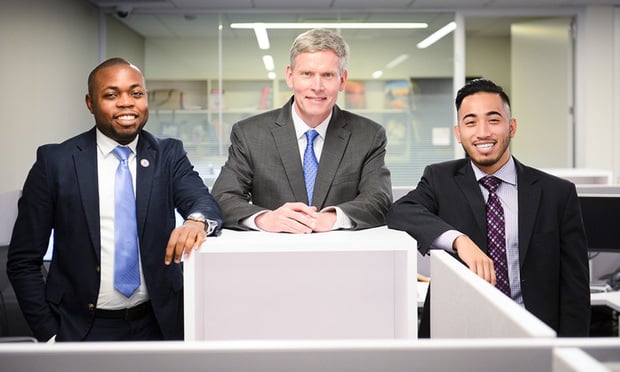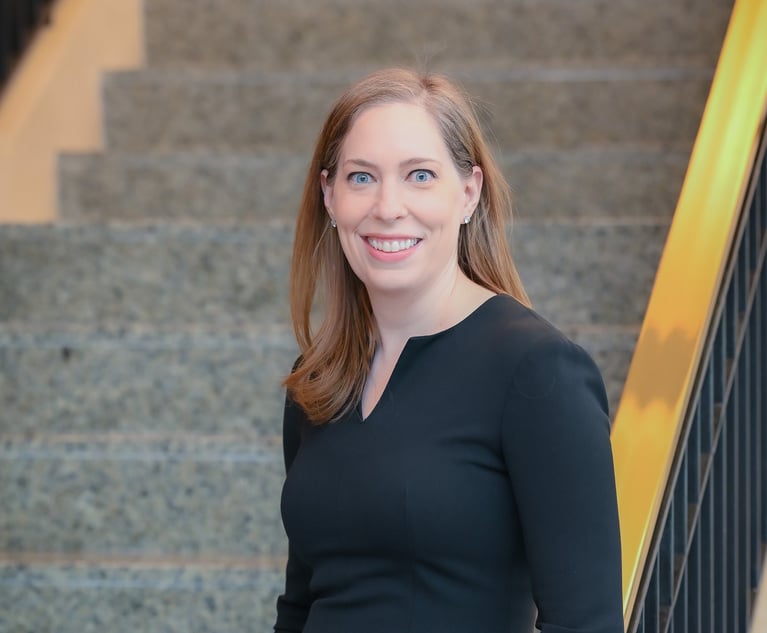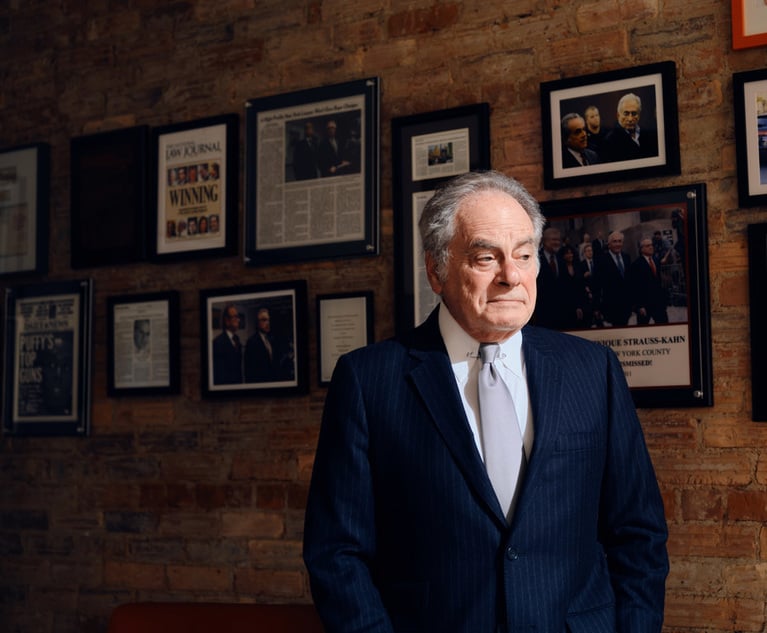Law Firm's Internship Program Offers Military Veterans a Career Stepping Stone
Hughes Hubbard & Reed's internship program is designed to help veterans transition from the military to the private sector.
November 09, 2017 at 06:50 PM
24 minute read

For eight weeks this fall, two men who each spent four years on active duty in the U.S. Marine Corps worked on the 15th floor of Hughes Hubbard & Reed's downtown Manhattan office, sitting behind desks, working on spreadsheets and analyzing invoices.
No longer in uniform, the former Marines, John Ly and Ephraim Agbenor, learned the basics of corporate accounting. They were taught how to handle invoices and pay bills, accounting reconciliation and the general nuts and bolts of law firm finance. It was their first private sector job out of the military.
“This was a big adjustment for me personally,” said Agbenor. “In the military, we are so used to doing things in a certain way,” but in an office environment, “people are really allowed to do stuff on their own.”
Hughes Hubbard hired Agbenor and Ly as part of the firm's second year running a veterans internship program that was started by Robert McGowan, the firm's chief financial officer and a former Army officer.
McGowan said the firm would like to continue the program and see it spread to other law firms in New York, citing an increasing need to help the large population of veterans transition out of the military and into the private sector.
While McGowan said some law firms in Boston had similar veteran internship programs, he is not aware of a law firm in New York that specifically targets the veteran population for internships. And two firms that previously had internship spots for veterans in Boston—Wilmer Cutler Pickering Hale and Dorr and Locke Lord—said they don't have them this year, although they offer pro bono assistance and other support for veterans.
McGowan initiated a veteran internship program at his prior firm, Edwards Wildman Palmer, a legacy firm to present-day Locke Lord, in 2013 in London and 2014 in Boston. When he moved to Hughes Hubbard in 2015, the firm had its first class of three veterans who worked in the marketing, finance or office facilities departments. Although the firm did not have any veteran interns last year, it resumed the program in 2017, hiring Ly and Agbenor to work in its finance department. They were paid $15 an hour on a part-time internship schedule because they were full-time college students.
Both said they are hoping to use the Hughes Hubbard experience as a stepping stone in their careers to the private sector. Agbenor, 30, a native of Ghana who moved to New York in 2010, spent four years in the Marines, including two years stationed in Japan. He is now studying finance at Pace University. Ly, who grew up in Camden, New Jersey, joined the Marines right after high school and was stationed in Hawaii, at one point traveling to Japan for training. He is now enrolled at Baruch College, majoring in accounting.
McGowan said the internship program is simple enough that any law firm could do it, noting the interns are paid a flat fee and can offer assistance in any support department. “Any law firm could do this with very little logistical effort because they all have a back office,” he said.
McGowan said the goal isn't necessarily to motivate the interns to focus on the legal industry or becoming lawyers. “Our goal is more modest, to give them that jump start into that first career,” he said. “Understanding our civilian office environment is very helpful, particularly with young people who have gone straight into the military in a very structured environment.”
And the benefits work both ways, he said.
“You get good service from them, and our folks learn something from them,” he said. “These young people have lived a lot more life than the average young person by the time they have gotten out of service.”
Meanwhile, the veterans learn business basics, including how to pay a bill when an invoice is due and accounting reconciliation. “It's not glamorous,” he said. “It's really the nuts and bolts of finance. But it's wonderful for them to be able to put it on their resumes to say they worked at an Am Law 200 firm in the finance department.”
Ly, 26, said the experience helped him understand how a company works. In addition, it “helps me prepare for when I actually get a full-time job,” he said.
Ly and Agbenor said such a program at other firms would be useful for veterans overall.
“I strongly believe there are so many people who are seeking opportunities like this,” Agbenor said. “I highly recommend that any law firm or corporation or organization really wanting to help veterans [should] take up initiatives like this and help vets transition to the corporate world.”

For eight weeks this fall, two men who each spent four years on active duty in the U.S. Marine Corps worked on the 15th floor of
No longer in uniform, the former Marines, John Ly and Ephraim Agbenor, learned the basics of corporate accounting. They were taught how to handle invoices and pay bills, accounting reconciliation and the general nuts and bolts of law firm finance. It was their first private sector job out of the military.
“This was a big adjustment for me personally,” said Agbenor. “In the military, we are so used to doing things in a certain way,” but in an office environment, “people are really allowed to do stuff on their own.”
McGowan said the firm would like to continue the program and see it spread to other law firms in
While McGowan said some law firms in Boston had similar veteran internship programs, he is not aware of a law firm in
McGowan initiated a veteran internship program at his prior firm,
Both said they are hoping to use the
McGowan said the internship program is simple enough that any law firm could do it, noting the interns are paid a flat fee and can offer assistance in any support department. “Any law firm could do this with very little logistical effort because they all have a back office,” he said.
McGowan said the goal isn't necessarily to motivate the interns to focus on the legal industry or becoming lawyers. “Our goal is more modest, to give them that jump start into that first career,” he said. “Understanding our civilian office environment is very helpful, particularly with young people who have gone straight into the military in a very structured environment.”
And the benefits work both ways, he said.
“You get good service from them, and our folks learn something from them,” he said. “These young people have lived a lot more life than the average young person by the time they have gotten out of service.”
Meanwhile, the veterans learn business basics, including how to pay a bill when an invoice is due and accounting reconciliation. “It's not glamorous,” he said. “It's really the nuts and bolts of finance. But it's wonderful for them to be able to put it on their resumes to say they worked at an
Ly, 26, said the experience helped him understand how a company works. In addition, it “helps me prepare for when I actually get a full-time job,” he said.
Ly and Agbenor said such a program at other firms would be useful for veterans overall.
“I strongly believe there are so many people who are seeking opportunities like this,” Agbenor said. “I highly recommend that any law firm or corporation or organization really wanting to help veterans [should] take up initiatives like this and help vets transition to the corporate world.”
This content has been archived. It is available through our partners, LexisNexis® and Bloomberg Law.
To view this content, please continue to their sites.
Not a Lexis Subscriber?
Subscribe Now
Not a Bloomberg Law Subscriber?
Subscribe Now
NOT FOR REPRINT
© 2025 ALM Global, LLC, All Rights Reserved. Request academic re-use from www.copyright.com. All other uses, submit a request to [email protected]. For more information visit Asset & Logo Licensing.
You Might Like
View All
Elizabeth Cooper of Simpson Thacher on Building Teams in a 'Relationship Business'
4 minute read
For Paul Weiss, Progress Means 'Embracing the Uncomfortable Reality'
5 minute read
Ben Brafman's Professional Legacy After 50 Years? Himself

Many Americans Don't Trust the Supreme Court This Election; David Boies Isn't One of Them
Trending Stories
Who Got The Work
J. Brugh Lower of Gibbons has entered an appearance for industrial equipment supplier Devco Corporation in a pending trademark infringement lawsuit. The suit, accusing the defendant of selling knock-off Graco products, was filed Dec. 18 in New Jersey District Court by Rivkin Radler on behalf of Graco Inc. and Graco Minnesota. The case, assigned to U.S. District Judge Zahid N. Quraishi, is 3:24-cv-11294, Graco Inc. et al v. Devco Corporation.
Who Got The Work
Rebecca Maller-Stein and Kent A. Yalowitz of Arnold & Porter Kaye Scholer have entered their appearances for Hanaco Venture Capital and its executives, Lior Prosor and David Frankel, in a pending securities lawsuit. The action, filed on Dec. 24 in New York Southern District Court by Zell, Aron & Co. on behalf of Goldeneye Advisors, accuses the defendants of negligently and fraudulently managing the plaintiff's $1 million investment. The case, assigned to U.S. District Judge Vernon S. Broderick, is 1:24-cv-09918, Goldeneye Advisors, LLC v. Hanaco Venture Capital, Ltd. et al.
Who Got The Work
Attorneys from A&O Shearman has stepped in as defense counsel for Toronto-Dominion Bank and other defendants in a pending securities class action. The suit, filed Dec. 11 in New York Southern District Court by Bleichmar Fonti & Auld, accuses the defendants of concealing the bank's 'pervasive' deficiencies in regards to its compliance with the Bank Secrecy Act and the quality of its anti-money laundering controls. The case, assigned to U.S. District Judge Arun Subramanian, is 1:24-cv-09445, Gonzalez v. The Toronto-Dominion Bank et al.
Who Got The Work
Crown Castle International, a Pennsylvania company providing shared communications infrastructure, has turned to Luke D. Wolf of Gordon Rees Scully Mansukhani to fend off a pending breach-of-contract lawsuit. The court action, filed Nov. 25 in Michigan Eastern District Court by Hooper Hathaway PC on behalf of The Town Residences LLC, accuses Crown Castle of failing to transfer approximately $30,000 in utility payments from T-Mobile in breach of a roof-top lease and assignment agreement. The case, assigned to U.S. District Judge Susan K. Declercq, is 2:24-cv-13131, The Town Residences LLC v. T-Mobile US, Inc. et al.
Who Got The Work
Wilfred P. Coronato and Daniel M. Schwartz of McCarter & English have stepped in as defense counsel to Electrolux Home Products Inc. in a pending product liability lawsuit. The court action, filed Nov. 26 in New York Eastern District Court by Poulos Lopiccolo PC and Nagel Rice LLP on behalf of David Stern, alleges that the defendant's refrigerators’ drawers and shelving repeatedly break and fall apart within months after purchase. The case, assigned to U.S. District Judge Joan M. Azrack, is 2:24-cv-08204, Stern v. Electrolux Home Products, Inc.
Featured Firms
Law Offices of Gary Martin Hays & Associates, P.C.
(470) 294-1674
Law Offices of Mark E. Salomone
(857) 444-6468
Smith & Hassler
(713) 739-1250






